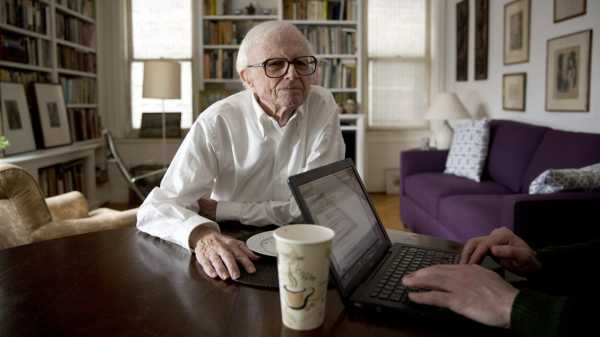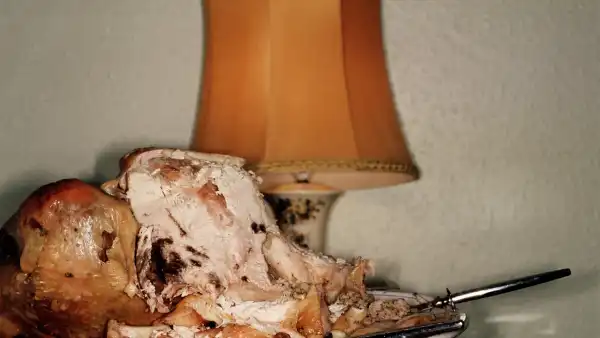
In the spring of 2012, I got a call from William Zinsser, asking if I
thought I could teach him to write poetry. “Yes,” I replied, confident
not so much in myself as in him: if Zinsser, the beloved nonfiction
guru, the author of “On Writing Well” and eighteen other books, couldn’t
be taught to write poetry, nobody could. There was just one catch: Bill
was blind.
He wasn’t completely blind, not yet; he could still make out shapes and
shadows. Progressive glaucoma had recently caused him to retire from
writing prose, a practice he’d maintained, weekdays from nine to five,
into his eighty-ninth year, working in a one-room office on East
Fifty-fifth Street. Bill’s daily commute to that office—a half-mile
walk—had become too harrowing.
Every Thursday at 1 P.M., while Bill’s wife, Caroline, was out, the two of us would sit at his
dining-room table. We’d begin with lunch, chicken-salad sandwiches I
brought with me. As we ate, we talked. Everyone was wondering how the
career of Derek Jeter, the aging Yankee shortstop, now mired in a long
slump, was going to end. “He’ll figure it out,” Bill said. “He always
has.”
Our lunch conversations often morphed into our writing sessions, when
I’d open my laptop and start typing. While Bill mused aloud on a
subject—tyrannical childhood dance teachers, his lifelong avoidance of
libraries, or stadium billboards advertising Mrs. Wagner’s Pies—I’d type
a page or two of particularly good phrases and sentences. Then I’d read
it back. “I said that?” he’d interject. Even people as well-spoken as
Bill seldom hear the poetry in what they say.
The biggest obstacle standing between Bill and poetry was his belief
that he possessed no interior life. He had declared this to me years
earlier, reclining on the beach below his summer home in Niantic,
Connecticut.
“How is that possible?” I asked.
He pointed across the water, where the North Fork of Long Island
crouched low on the horizon. “If I were an introspective person,” he
said, “I’d be wondering about what’s over there. But I’m not interested
in what’s over there.” He said he didn’t philosophize or ruminate, or
write novels, and he rejected the idea that his own writing could be
“art.” But now Bill’s blindness plunged him deep inside himself, whether
he liked it or not.
The first poem Bill wrote was inspired by a moment involving his
assistant, Julia. While cleaning out his files, she’d found some
strangely textured paper and wanted to know what it was. Bill’s poem
read, in part:
As she left she thanked me profusely
for letting her have the onion skin,
as if I’d given her chocolate or diamonds.
“I showed it to my boyfriend,” she told me later,
“We hung it from the ceiling.”
“What do you think this poem is about?” I asked Bill.
“Onion skin,” he said.
“What do you think this poem is really about?”
“What’s it about?” he asked.
“A love triangle,” I said.
“Beg pardon?”
On another Thursday, Caroline pulled me aside when I arrived, to tell me
that they’d switched one of Bill’s medications and he’d become
disoriented. “He keeps asking for the time,” she said, “and doesn’t know
where he is.” She was tense and scared, near tears. She doubted that we
would be able to write that day, but thought it would still be good if I
visited. “He keeps asking for you,” she said.
I greeted Bill at the dining-room table, and he grabbed my hand as he
always did, then reached for my shoulder, saying, “I am so glad you’re
here.” As we ate our chicken sandwiches and talked, I could see that he
was not himself. But I got out my laptop and typed the following, which
he delivered verbatim, holding up his sandwich like Yorick’s skull:
This piece of bread that I’m holding
could be in Denver. It’s nowhere.
Up to a few weeks ago I could
scroll back. If someone asked,
“What’s Burma like?” I could see it.
How does it happen?
When I returned the next week, his dosage had been worked out, and he
was back to his lucid self. I read aloud his poem from the week before,
and he couldn’t for the life of him understand why I would praise it.
“What makes it good?” he wanted to know.
“It has space, Bill. And it’s not explaining or apologizing for itself.”
“What’s it about?” he asked.
“I think it’s about surrendering to something,” I said.
Bill sat with that for a while, then said, “What if I don’t like the
poem?”
“That’s O.K.,” I said.
A few weeks later, Bill wrote a poem called “Beyond Directory
Assistance,” about the speaker’s attempt to locate an old college
friend, Arthur Morgan, by reaching out to the class scribe, Herb Hobler:
Neither man had turned up in class obituaries . . .
where were they? I could only guess
that they had moved to some penultimate
port of call, some “Retirement Village”
or “Assisted Living Facility” in some
nameless town in nameless America,
“to be near the children.”
The following week, before I had even unpacked our sandwiches, Bill
said, “We have to revise ‘Beyond Directory Assistance.’ ” He explained
that, during the week, he’d managed to locate his two old Princeton
friends, rendering the poem “untrue.”
“Of course it’s true,” I said.
“How is it true?”
“The emotion is true,” I said. “What if we just changed their names?”
“How about a footnote?” he asked.
“You’re gonna have a footnote in a poem?”
We went back and forth like this for most of an hour, until he said, “I
think it’s quite complete now as a poem—as long as you don’t get three
readers who say, ‘I just saw them last week. They’re alive and playing
squash.’ ”
In this quarrel, and others like it, Bill was skeptical, almost
suspicious, of his own poems, but he showed great trust in me as a
teacher. He regarded me as a spokesperson for poetry, a land he was
entering with confusion and wonder.
Bill and I had met in 1999, when I was teaching at Stuyvesant High
School. I had given a student teacher a copy of “On Writing Well,” and
she was so charmed by it that she phoned Bill to ask if he would pay our
class a visit. He showed up the next week, in a fedora, sport coat, and
sneakers, to talk to a group of fourteen-year-olds. Bill also took an
interest in me, which at first I chalked up to his lifelong reporter’s
curiosity. Then he invited me to lunch, which became a standing
date—once a month for fifteen years.
In conversation, Bill was an accompanist at heart. He wanted to know
about me, who I was, what I was writing. He was especially interested in
my prose, even though I’d hardly written any. He’d get me talking, and
every so often would remark, “I have never heard of anything like that.”
He’d follow up with a phone call, repeating, “That’s something I’ve
never heard of. You should write about that.” In a week or two, he might
call again, asking if I’d thought more about the article. “Here’s how it
could go,” he’d say, then delineate an arc. “We’ll make a prose writer
out of you yet.”
Not long after shutting down his office, Bill suffered a mysterious
fracture of his femur, which required spending time in a long-term
recovery facility on the Upper East Side. The building was gloomy; at
times, the cries of patients echoed down the halls. When I visited, Bill was
in his room, alone and scared. He squeezed my hand and reached for my
shoulder. He asked what time it was. He asked me to make sure that the
nurses didn’t forget to come and give him his anxiety medication before
they left for the night.
Bill and I talked until the sun went down, in quiet waves of
conversation. He asked me to stay until he fell asleep. He told me how
hard this part of the day had always been for him, even as a child. He
told me about other fears, and chronic anxieties. It would have felt
like a confession if he hadn’t been speaking so plainly and without
shame.
I think Bill saw not only that our friendship needed to shift but that
it could shift. He often joked self-effacingly about being a Wasp and
subject to the formal stiffness of that privileged class—he’d even
written a humorous article on the subject. But that evening I saw his
utter grace: this man of towering faculties, opening his palms.
One day, at lunch, after he’d returned home, Bill recounted an incident
that had come up with his assistant. Julia was about to leave her job
and had posted an ad on Craigslist to find her replacement. Bill told me
that, when reading aloud through a stack of applications, she had come
to an applicant who identified as transgender. He then instructed her to
move that application to the bottom of the pile. Julia scolded him,
shocked that he of all people would do such a thing. (Julia, I recently
learned, recalls only that Bill dismissed a person who’d listed
volunteering at an L.G.B.T.-rights nonprofit in their work history.)
“That girl,” Bill said when he had finished recounting the incident,
“has no idea what I’ve written about black people and civil rights.”
He and Caroline, who had joined us at the table for lunch, wanted to
know what I thought.
What I thought was, I won’t ever be coming out to Bill.
Not long after Bill went blind, I had started hormone-replacement
therapy and was living part-time as a woman. Every Thursday, to go work
with him, I’d take off my nail polish and throw on trousers and a
sweatshirt. Every Thursday, Bill squeezed my hand and said, “I am so
glad you’re here” to a person named Douglas Goetsch, who was fading out
of existence.
Two of the things that terrified me when I decided to transition were
the prospect of not being able to find employment and the thought of
losing people I loved. Here, in Bill’s search for a new assistant, was
an instance of both: a trans person who had no chance at a job, because
Bill didn’t want someone like them—someone like me—anywhere near him.
Claiming to have black friends is a bizarre defense against accusations
of transphobia, but it’s one I’ve encountered often: among the older
Americans I know, many think that their support for civil rights in the
nineteen-sixties inoculates them from being prejudiced in any form. The
majority of them were aligned with the women’s movement of the
seventies. As they aged, fewer were aboard for gay rights, and not all
supporters of the movement were comfortable around gay people. And now,
when it comes to trans people, they short-circuit altogether. Unlike
Julia, I wasn’t surprised by Bill’s reaction. I knew that if I came out
to him, there was a good chance that we would lose each other. Trans
people are forced to make such judgment calls all the time—our survival
depends on it.
Yet, in some ways, Bill may have understood me better than anyone. One
day, he asked if I’d written anything new, and I told him no—just a
cover letter to a college looking for a poetry teacher. “Let’s hear it,”
he said.
After I read it, he said, “You haven’t sent that off, have you?”
I had.
“It’s not you,” he said.
“But they asked for my teaching philosophy,” I replied.
“Why are you mentioning these other people?” My letter had referenced
William Packard, Stephen Dunn, and some others.
“Because I use some of their ideas when I teach. They’re not mine.”
“Who cares! I’m sure those ideas once weren’t theirs either.”
His criticism was even stronger the next morning. In a phone call, he
delivered a sermon (I wasn’t allowed to speak) on the subject of not
allowing others to define me. “I’ve been sitting here trying to figure
out why you are holding yourself back,” he said. He ordered me to write
another letter, one that would tell readers about the person he knew
me to be. “You need to throw the switch,” he said. “Write it in the
third person if you have to, and spare us your teaching philosophy.
You’re a poet, not a supplicant.”
Before hanging up, he said, “Do it for me.”
What Bill said about holding myself back feels true not just for me but
for every trans person I know. Until we are out of the closet, we do
allow others to define us; we may be afraid to take up space or to ask
for things, such as a job, or more appropriate clothing or pronouns. Our
bodies feel like borrowed shells, our lives are in rooms we don’t enter,
and the people around us sense that something is missing, something they
can’t quite place. Bill, who had no clue about trans experience,
nevertheless understood that I had yet to “throw the switch.”
If I’d ever come out to Bill, I would have been willing to wait, as long
as it took, for him to accept me. But I knew that it would never come to
that, because the work I was doing with him, the visits and the poetry
lessons, was also hospice care. Bill was in a state of increasing panic,
riddled with tension, most obviously in his hands, which were
incessantly trembling and clenching. He used them to feel his way along
the walls, occasionally lunging for a doorjamb or a light switch. Soon,
he required someone to lead him around his apartment—not arm-in-arm but
walking backward and holding both his hands the way you’d support a
beginning skater. He leaned back, afraid, as if he were about to step
into a chasm. Bill had been an unusually healthy man well into his
eighties, who took the stairs and went to the gym, but the ordeal of
blindness was crushing him, day by day. His systems were shutting down.
Some days, he lay on the daybed in his study, talking about the past, or
the arts, or the King James Bible. He gave a disquisition on the chord
progression of Jerome Kern’s “Ol’ Man River”—complete with singing—that
I wish I had on tape. He still wrote poems with me on days when he
could, and he wrote beautifully toward the end, with capacities he’d
never before shown. The last poem he wrote, called, “The Psalm Writers,”
ended like this:
When the work is done, he can go
lie under the Eucalyptus tree
and feel good about it. He has left something.
He’s without the impulse that caused him to pick out
that jagged piece of granite in the middle of the Judean Desert,
to say, “Hey, may your life be as durable
as that piece of granite over there.”
One of the things the great teachers do is prepare you for their
absence. They give you confidence, they give you your life, and, by
doing so, they make themselves obsolete. Bill died on a Tuesday, in May
of 2015, surrounded by family. I got the call from his son John two days
later, and attended his funeral at St. Bart’s Church, on Park Avenue,
ten days after that. Bill had joined that church several years before
and had cultivated a friendship with the minister; he told me that he
wanted the person who would preach at his funeral to have known him
personally. Bill also arranged the music—Christian hymns, along with all
four verses of “America the Beautiful.” Mourning Bill that day was the
last time I ever wore a man’s suit and tie.
Sourse: newyorker.com






